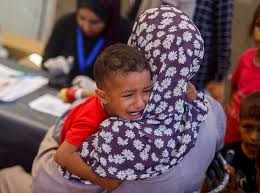GENEVA (TASS): Director General of the World Health Organization (WHO) Tedros Adanom Ghebreyesus expressed hope for China’s support for a new stage in the study of the origin of the SARS-CoV-2 coronavirus. Speaking on Friday in Geneva at a briefing for WHO member countries, he announced a five-point research program, including “audits of laboratories and research institutes” that operated in the area of initial detection of human infection in December 2019.
“We expect China to support the next phase of this scientific process [of studying the origin of SARS-CoV-2] by sharing all the necessary data in a spirit of transparency,” the CEO said. WHO expects its member countries to contribute to these studies and “refrain from politicizing them.”
According to Gebreyesus, at the beginning of this week, WHO sent states “a circular letter detailing the proposed next steps” in the study of the origin of SARS-CoV-2. This document, developed by the organization’s secretariat, deals with five areas of work. It is “a comprehensive study of people, wildlife, and captured wildlife, farm animals and the environment”, a study of the geographical areas where SARS-CoV-2 was first discovered, as well as the markets in which animals are traded, including those in which sold in the Wuhan Huanan market. Molecular studies are envisaged, including “early viral sequencing”. And, finally, it is planned to conduct “audits of the relevant laboratories and research institutes,
The head of WHO stressed that finding out the origin of SARS-CoV-2 is necessary to prevent future pandemics. This is a duty to millions of people whose relatives and friends have died from the effects of the infection.
As Gebreyesus further noted, “we know SARS-CoV-2 is not the last pathogen with pandemic potential.” There will be other pathogens, so “you need to understand their origins,” he said.
The Director General said that the WHO Secretariat “is establishing a permanent international advisory group on the origin of new pathogens.”
This group is assigned “an extremely important role in the next stage of studying the origin of SARS-CoV-2, as well as the origin of future pathogens.” It will be formed from highly qualified experts, taking into account geographical representation and gender balance.
Investigation into the circumstances of the pandemic
At the previous stage of the study of the origin of SARS-CoV-2, an international group of experts formed by WHO worked in China in January-February. Scientists visited the Wuhan Huanan seafood market, where an outbreak of coronavirus disease was first recorded in December 2019, a number of infectious diseases hospitals in the city, as well as the Wuhan Institute of Virology. At the final press conference on February 9, representatives of the group said that they had not been able to achieve any major breakthrough, however, in the course of joint work with colleagues from the PRC, they were able to determine the main hypotheses for the appearance of the coronavirus. The most likely version, according to experts, is that the virus was transmitted from wild animals through an intermediate link. In their opinion, the virus could first spread among one animal population,
At a briefing in Geneva on July 15, Ghebreyesus did not rule out that the spread of the coronavirus could be the result of an “emergency in the laboratory.”
The Chinese Foreign Ministry on Friday expressed the hope that WHO experts during a new phase of research will pay more attention to the theory that the coronavirus was brought to Wuhan along with frozen food, and did not appear as a result of a leak from a laboratory.






